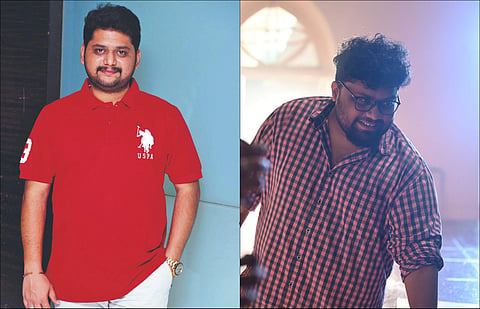

Going by the rushes of Hostel Hudugaru Bekagiddare, directed by Nithin Krishnamurthy, is set for a fun riotous ride. Cinematographer Arvind Kashyap and composer Ajaneesh Lokanath faced interesting challenges while pulling off this youthful entertainer. We spoke to the top-tier technicians who are not just the toast of Kannada cinema, but Indian cinema too.
The film had only five percent space for musical score: Ajaneesh Loknath
Ajaneesh Loknath, known for his diverse musical endeavours, shares his experience working on such a chaotic film that features a multitude of artists. Despite the expectation of numerous songs in a youthful film, Hostel Hudugaru Bekagiddare surprisingly includes only two songs. “Hostel Hudugaru... is mostly a conversation-based film among the hostel boys. I had to strategically place the music and approach it from a different perspective. The film, entirely relying on dialogue, had only five percent space for musical score, aside from the songs,” says Ajaneesh, who has created a unique blend of electronic dance music (EDM) with elements of trap and other contemporary styles. “Nithin’s approach to the film was refreshing and innovative, making it a one-of-a-kind experience in Indian cinema, and that helped me enhance the tunes to a different kind.”
Delving into the technical aspects of Hostel Hudugaru..., Ajaneesh says, “I had to meticulously design the music, which is placed in short intervals of 5 to 10 seconds and synchronised with the conversations. Despite the dialogue-heavy nature of the film, I aimed to seamlessly integrate the music, which proved to be a challenging task, and managed to create a cohesive audio experience.”
The music director adds that while youthful films typically feature multiple songs, Hostel Hudugaru Bekagiddare deviates from this norm. “Given the concept of the film revolves around hostel life, the narrative crafted by Nithin didn’t offer much scope for songs. Nevertheless, the film is filled with unexpected surprises and engaging conversations, allowing for a different kind of storytelling approach. The uniqueness and appealing nature of the film lie in its overall making, music, and its ability to captivate audiences,” he says.
I had to unlearn certain techniques for the film: DOP Arvind Kashyap
Arvind Kashyap, the cinematographer of Hostel Hudugaru Bekagiddare, had a unique opportunity in the youthful entertainer. “Even as I was running around as a cinematographer, they convinced me to come in front of the camera too,” chuckles Arvind, as he recalls how shooting the film allowed him to relive his engineering days, and even handle crowd scenes with ease.
One of the highlights of working on Hostel Hudugaru... was the team’s chance to temporarily live in a hostel during the shoot. “We would shoot there and get back to our rooms after our work. We got an empty hostel, and it was revamped. Watching the film, one can find thousands of hidden details throughout the frames,” he explains.
Arvind considers Hostel Hudugaru... to be his most challenging film to date, as it pushed him beyond what he had learned or experienced before. “With around 200 people per frame and with random dialogues, I had to memorise the dialogues that followed and their positions in each shot, and the intentional chaos is visible on screen, as the script demanded it,” says Arvind, adding, “The entire film was shot handheld and the camera seamlessly moved between people without fixed blocking, capturing shots from all angles in a 360-degree fashion, immersing itself within the crowd.”
The filming process extended over 65 days, with two weeks dedicated to rehearsals. Arvind explains that being part of the narration in a cinema vérité style meant interacting with the actors during the recording. Reflecting on the experience of facing the camera, he laughs and says, “I realised that I didn’t want to be an actor but wanted to ensure that I handled the camera while not missing any dialogues.”
In terms of uniqueness, Hostel Hudugaru... stands apart from the cinematographer’s previous projects, admits Arvind. He says, “While in most films, the aim is to achieve visual perfection in every frame, this film focused on creating an authentic atmosphere. I had to unlearn certain techniques, as anything that looked too polished or good became artificial. The goal was to make it look intentionally imperfect to maintain realism.”
Arvind concludes by reflecting on the film’s significance. “From a cinematography perspective, Hostel Hudugaru Bekagiddare took me back to my first film, where I had to start from scratch and embrace a fresh approach to capture the essence of the story.”